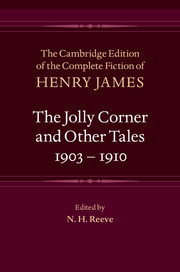Book contents
- Frontmatter
- Contents
- Acknowledgements
- List of Abbreviations
- General Editors’ Preface
- General Chronology of James’s Life and Writings
- Introduction
- Textual Introduction
- Chronology of Composition and Production
- Bibliography
- The Jolly Corner and Other Tales 1903–1910
- Glossary of Foreign Words and Phrases
- Notes
- Textual Variants
- Emendations
- Appendices
I
Published online by Cambridge University Press: 11 April 2021
- Frontmatter
- Contents
- Acknowledgements
- List of Abbreviations
- General Editors’ Preface
- General Chronology of James’s Life and Writings
- Introduction
- Textual Introduction
- Chronology of Composition and Production
- Bibliography
- The Jolly Corner and Other Tales 1903–1910
- Glossary of Foreign Words and Phrases
- Notes
- Textual Variants
- Emendations
- Appendices
Summary
He had been out but once since his arrival, Mark Monteith; that was the next day after—he had disembarked by night on the previous; then everything had come at once, as he would have said, everything had changed. He had got in on Tuesday; he had spent Wednesday for the most part down town, looking into the dismal subject of his anxiety—the anxiety that, under a sudden decision, had brought him across the unfriendly sea at mid-winter, and it was through information reaching him on Wednesday evening that he had measured his loss, measured above all his pain. These were two distinct things, he felt, and, though both bad, one much worse than the other. It wasn't till the next three days had pretty well ebbed, in fact, that he knew himself for so badly wounded. He had waked up on Thursday morning, so far as he had slept at all, with the sense, together, of a blinding New York blizzard and of a deep sore inward ache. The great white savage storm would have kept him at the best within doors, but his stricken state was by itself quite reason enough.
He so felt the blow indeed, so gasped, before what had happened to him, at the ugliness, the bitterness, and, beyond these things, the sinister strangeness, that, the matter of his dismay little by little detaching and projecting itself, settling there face to face with him as something he must now live with always, he might have been in charge of some horrid alien thing, some violent, scared, unhappy creature whom there was small joy, of a truth, in remaining with, but whose behaviour wouldn't perhaps bring him under notice, nor otherwise compromise him, so long as he should stay to watch it. A young jibbering ape of one of the more formidable sorts, or an ominous infant panther, smuggled into the great gaudy hotel and whom it might yet be important he shouldn't advertise, couldn't have affected him as needingmore domestic attention. The great gaudy hotel—The Pocahontas, but carried out largely on “Du Barry” lines—made all about him, beside, behind, below, above, in blocks and tiers and superpositions, a sufficient defensive hugeness; so that, between the massive labyrinth and the New York weather, life in a lighthouse during a gale would scarce have kept him more apart.
- Type
- Chapter
- Information
- The Jolly Corner and Other Tales, 1903–1910 , pp. 394 - 397Publisher: Cambridge University PressPrint publication year: 2017

